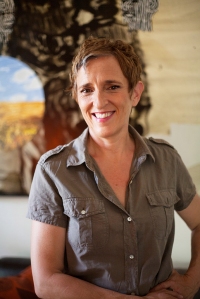Sue-Ellen Brown

Charlotte Wood
Charlotte Wood is having an overwhelming year. Her fifth novel, The Natural Way of Things, won the 2016 Stella Prize, the Indie Book Awards for Fiction and Best Book of the Year was announced as the 2016 Writer in Residence at the University of Sydney’s Charles Perkins Centre.
The catalyst for Ms Wood’s tale of a group of women trapped on a derelict farm in the bush was a documentary about the brutal treatment of young girls at the Hay Institution for Girls in the 1960s. Their crime was to speak out against their sexual abuse; although she didn’t want to write about the Hay Institution itself, Ms Wood said the story gripped her with such rage she knew she had to write about the subject. Once started, she said she became alert to so many contemporary cases of women blamed for their sexual abuse and this fuelled her writing and the background stories for the 10 young women in her book, all of whom were involved in a public sex scandal.
In conversation with writer and critic Tegan Bennett Daylight on Monday evening, Ms Wood said while her new book may be challenging to read it was also uncomfortably confronting for her.
The Natural Way of Things accosted her on so many levels there were times she wanted to walk away from it. “I was terrified,” she said. “I didn’t like what was coming out of me, I didn’t like going to this dark place.” And she still feels that she wants to protect people from the story, even though it is the most popular book she has written.
So dark, provocative and full of conflict was the subject, at times the writer questioned her ability to continue. She said it felt “malignant”, her work froze and she struggled to progress. She told herself, “I can’t write this book, but I can’t not write this book.”
With the help of her psychologist colleague, Alison Manning, Ms Wood came to understand that she had to go to that “weird, dark, frightening place in order to find the gold”. It was a major revelation when she let herself do that and “allowed the book to come.” And, just to add to the many challenges, this approach made her question her previous “work ethic” approach to writing.
“I also had to learn to think of the book as a place to go to and I had to leave my ruthless judgement of myself outside.” She had to let go of the thought that people would think badly about her and said that once she did, the material came flooding out.
Ms Wood first started to think there was something different about the book when her close writer friends, her agent and publisher were all saying, “Oh my god, there is something big in this.” When her publisher emailed to say this was an important book, she said she knew her life was about to change. “There was something in the material … that was doing something that I didn’t understand.”
Readers have had intense responses to the book. “People often clutch their stomach or chest when they talk to me about it and say it made them feel like something was inside them. There is something animal about it,” she said. The reaction of men to the book was also surprising. Ms Wood said a friend suggested to her that the book and the language it uses lets men feel what it is like to be treated like these women.
Ms Wood hopes the response to the book is about the art as well as the message. She set about “joining the dots between the stories of these girls” and deliberately used the actual language that was used to describe the women in the real-life cases.
Without giving too much away, Ms Wood said the split ending causes a lot of discussion and divides some readers, but she did not want a simple or predictable conclusion. “The end points to what I think of contemporary womanhood, in that sometimes we choose our own enslavement. To not choose that takes a lot of courage and to be completely free in our contemporary society you need to give up on approval.”